Photos: Dóri Hrisztu-Pazonyi
Hungarian duo Black Nail Cabaret has shown in their six albums that there are still unexplored paths in dark pop. As they have demonstrated in their albums, each one with an original concept, they have not been afraid to try new things, be it more organic sounds or approaching more commercial pop although always with a edgy production. They are one of the bands that you should not miss this November at the Santuario festival in Madrid. Remember that on November 23rd the fantastic music arrives.
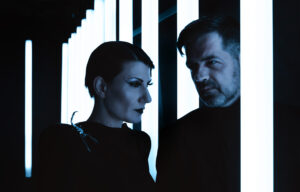 —Emese, you started as a performer in a fetish horror theatre group in Budapest. How was the experience? I guess it must kind of help forming your stage persona.
—Emese, you started as a performer in a fetish horror theatre group in Budapest. How was the experience? I guess it must kind of help forming your stage persona.
—It all started by being a dancer at a goth event called Kollektiva in Budapest back in the day. We figured quickly with Sophie (former BNC-member) that we liked to be on stage, we had plenty of ideas to perform stories with movement, to music, and we had friends with similar interests, so a theatre group of 7 people was formed. We continued to perform at the same event series, but we grew fast and ended up hosting 2 nights at the Merlin theatre in Budapest. What I also figured is that I am not good with spoken lines on stage. I can live in the story with movement and dance, but as soon as I have to open my mouth, it’s not authentic. I rather sing.
—We always like to discuss original influences and thanks to you I have heard about this artist for the first time. How would you describe the influence of performance artist Marina Abramović in your career?
—I think she was the first person who introduced total artistic freedom to me, in a radical way. I am not saying that I didn’t know any artists who were free before that, it is just that her work pushes exactly the right buttons in me, it is enlightening. I don’t necessarily agree with everything what she does, but she is a mind-blowing person, makes me think on the constant. I would love to have a cup of coffee with her and a long discussion about life and art.
—One of the aspects of the band (its penchant for “sexually explicit provocation”) is repeatedly commented in the articles/reviews. Do you see yourself as a provocative person? Is sexuality such an important part of your life?
—I see this all the time, this sexual agenda for BNC, which is mentioned quite often. I don’t think of it to be honest. I may very well be provocative to some people. I may live and express my sexuality in a different way, through different channels. Art can indeed be very sexual, but I don’t think the artist necessarily realises this, or that it is a conscious decision to pour sexuality into art. It is part of a human being, so it will manifest in one way or another.
—As you said before, at the beginning, Black Nail Cabaret were you and Sophia Tarr. How did you meet her and decide to start a band?
—Before being part of the horror theatre group called Art Macabre, we met at a goth club in Budapest more than 20 years ago. I think she asked for a cigarette. We became friends. She played the piano and I wanted to sing and write songs, so we put together what we have. We are good friends to this day.
—”Butterflies” was your very first single. Why did you choose this song? Any special meaning?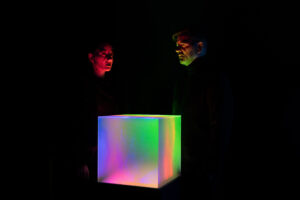
—I think this was one of the first demos I have ever made, which is not a cover song. It was a good practice, writing that song. Among the people who heard the first version, this was the most liked, and we liked it too. So, I think that is why it had become the first single.
—I guess that the lyrics of the song “Let Me In” are a reference to the vampire movie from 2010. Was a big influence for you?
—That’s right, I was very much under the influence of that Swedish vampire story from 2008 – not the American version in 2010, which I didn’t watch. Even the first visuals we used on YouTube for the demo were from Let the Right One In, the Swedish movie. Later I also read the book, which dug even deeper, I was obsessed! This is where the 2nd album’s title, Harry Me Marry Me Bury Me Bite Me comes from. It was a graffiti in one of the toilet stalls from the book.
—Have you thought of reissuing Emerald City, your first album?
—Yes, we thought of doing it with all albums, and we started with Pseudopop as it required the least amount of work. Emerald City would need to be completely redone, we wouldn’t release the songs in the current format. All would need to be rerecorded. I don’t think we have the original tracks, and also the sound and mixing aren’t great. We would love to do it with our current ears and minds.
—In a show with Covenant you met Daniel Myer. I guess that was an important moment for the band as he helped you get in touch with Basic Unit Productions and also you sang in one of the albums of his project Architect. How do you remember working with him in that album?
—Yes, we met back in 2011, when they performed in Budapest, he approached me after the show with the idea of the new Architect album. I think that work is my measure, for all collaborations, I got to enjoy everything I do as much I enjoyed working with Daniel’s demos. Unfortunately, it isn’t always that easy with other collabs as it was working with Daniel, I think our artist minds resonate well. I am forever grateful for that opportunity.
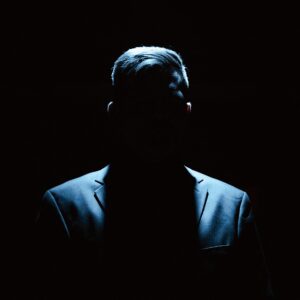 —Krisztian Arvai joined before the second album. Did you need another person on the keyboards or wanted to work with more people to compose the songs?
—Krisztian Arvai joined before the second album. Did you need another person on the keyboards or wanted to work with more people to compose the songs?
—Krisztian has always been part of the background, as we were working in the studio together from the first album, and we have co-written the second album and each album from then on. So, when Sophie announced she wanted to leave, after a short hesitation it seemed to be an obvious choice to invite Krisztian on stage. On stage, he is the safety, and I am danger.
—The electronic part of the second album sounds a bit more complex. How do you see the evolution from your first material?
—The first album was written in my tiny, rented studio flat, and we tried to make the best out of with the guys in the studio. For the second album, we already worked together with Krisztian at home so there was an obvious huge leap.
—Dichromat was the first album without Sophia Tarr. Was it difficult to continue without her?
—It was weird. It had been a journey for us, doing this band, with its ups and downs. Also, the profile had changed from a 2-girl duo to me and Krisztian. Sophie was more part of the game upfront, on the other hand Krisztian focuses on gear and music, so he is the safe spot in the back, I felt I was fronting alone, all eyes on me. I had to get used to it.
—Do you think that the lyrics in Dichromat are a bit deeper than in previous albums? Were you living a difficult time?
—The lyrics of Dichromat were written at the time when I didn’t know Sophie was going to leave the band, but indeed life was quite complex back then. We were living in London, in a small studio flat, that had space for only one person to create at a time. So, if Krisztian was working on some mixing, I had to wear headphones and work on the bed, or outside in the garden, or if I was practicing or recording vocals, he had to keep himself busy elsewhere to keep quiet in the room. We were also working a lot, I mean in our everyday jobs, besides music. But we made it work. Compared to that period, we now live a privileged life.
—After the gloomy Dichromat, we found the “pop” of Pseudopop, do you think that this was a kind of reaction to the previous album?
—I think it was a breath of fresh air, so to say, after we moved back to Hungary, into a bigger apartment. I had mixed feelings about moving back, but in a way, it was a relief even for me. Life in London felt quite temporary and rushed, from one day to another. When we moved back, I felt that there was a purpose again, especially for Krisztian. I think this shows on Pseudopop.
—We could find a bit of Madonna in “Rhythm X”, what other artists from the mainstream pop culture have influenced you?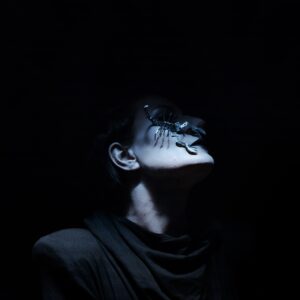
—”Rhythm X” was actually inspired by Marina Abramović’s performance from 1974, Rhythm 0. That is the time I was exploring her work, and I actually managed to meet her at a book signing in London. I also just started to discover who I really was, with all the failures and rotten stuff from the past. That’s what “Rhythm X” is about. As for pop artists, Madonna was a great deal of inspiration to me, but I also love Björk, although not sure how mainstream pop she is or ever was. I did listen to all kinds of stuff from the mainstream in the 90s, from Backstreet Boys to Michael Jackson, the list is very long!
—The track “90s” show some nostalgia for that decade. After this endless 80s revival, do you think we will have finally a 90s revival?
—I think there is a massive 90s revival, just looking at all the jeans with oversized checked shirts happening. I do hope that the newer generations to come will continue to discover the music of the 90s for themselves. I don’t know what happened in that decade, but growing up in the 90s was magic. From alternative music through hip-hop to rave, there was plenty of authenticity and inspiration. Nirvana, Ace of Base, LL Cool J, the Love Parade in Berlin, Alanis Morrissette, Daft Punk, damn, all within 10 years!
—Pseudopop was, according to you, “a summary of all the music that had a huge impact in our lives” and you did not care about styles. Do you think that we tend to limit ourselves with genre boundaries? Do you think that the album help breaking them?
—For us, it certainly helped. We always try to curate our own albums to make sure it is a neat bouquet of songs. Obviously, I still find this important, we are creating albums not EPs or singles after all, but with Pseudopop, we tried to let go with each song, and start with an empty mind, no expectations where it would go. We try to implement this freedom to all work.
—Four years later, in 2022 you released a remastered version with an additional track and a different order. Was this the original idea of the album?
—No, the original idea was the original track list. We had to reorganise so that it fits the time limitations of the LP. We didn’t want to release it without something new, though, therefore “Orchid” was added, which fits the Pseudopop atmosphere nicely, I think.
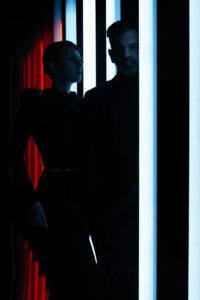 —The concept of the following album, Gods Verging On Sanity, was something like “We are Gods, with an anus.” Do you like to build your albums around concepts? How do you get the ideas for them?
—The concept of the following album, Gods Verging On Sanity, was something like “We are Gods, with an anus.” Do you like to build your albums around concepts? How do you get the ideas for them?
—There is always a period of writing, a year, or maybe 2 years. A period usually carries a theme for me, depending on the current topic I am reading or learning about, the area of my life I am developing, and so forth. I was very interested in the concept of death. I still am actually. Back in 2020 it was rather the fear of death, and now I am interested at the actual death, beyond the fear: what happens during dying, and after death. I think I am maxing this topic out, but it is a vast one. Don’t get me wrong, it does not fill every single day of my life, I have also been exploring other stuff like human relationships, especially in the context of patriarchal society.
—The following album (Woodland Memoir) was less electronic and counted with more musicians as it was credited to Black Nail Cabaret and Friends. How was working with other musicians in your own songs? Was recorded in a more live way?
—Absolutely. We started jamming with some good friends, to see how the songs would work in a different setting. It was an interesting, and heartwarming experience. It felt so reassuring to play with several other people at the same time. Somehow, it felt safe.
—You two, together with the guys from Ultranoire create your own label Dichronaut Records. What happened to the label, too much work?
—Yes, sadly that’s exactly it. After a while we felt it is not developing the way we wanted it to, we were going around in circles, and I didn’t feel that is was helpful to the band or any future bands we may be supporting. All the admin was on me all of a sudden, and besides BNC, I also run another office, so it became difficult to manage.
—Chrysanthemum, your last album, is about how to explore death and grief how to face life. You have said that people have written to you explaining how the songs have helped them. What kind of story have fans told you?
—I want to refrain from sharing exact quotes, but generally speaking, the music has helped them through difficult times, a passing of a family member or a difficult relationship, mental illness, panic attacks. It is so moving to make connections with people this way. It’s hard to describe with words, I am still just coming to terms with it.
—You have made many covers, from Rihanna and Britney Spears to Pet Shops Boys, Depeche Mode and Talk Talk. Even Rammstein. What do you look for in a song to cover it?
—I have to love it, I have to fangirl over it. Then I also have to see the potential of hearing it in a different context or setting. There are songs which I love, but are too good to be touched, or I would rather say, I cannot hear them in any other way in my head.
—How was singing in the last single of the legendary band Attrition? Any forthcoming collaboration?
—It was very enjoyable, and a challenge, in the best possible way. I love an unusual soundscape, it takes me to places. Martin is also a super kind, gentle person.
—Emke is your side project, and you released your second EP (Two) in 2017. Do you use Emke as a vehicle for songs that don’t fit in Black Nail Cabaret?
—Yes, as BNC is a collaboration after all. We both have to agree on a song to put it on the next album. There are songs which I created as not-BNC, and there are songs that may have started as BNC in my lab, but we agreed they won’t fit to the next album.
—What are the plans of the band for the future?
—We will see, songs are being written as we speak, but we don’t know how and what is going to happen. There is a Hungarian song which we may release by itself, as a digital single, which was written for a special promotion for a project called The Sound of Matra. Fekete Zaj Festival, in collaboration with the Swedish company Kilohearts, has created the Black Noise sound by converting the topographical texture of the Mátra mountains in Hungary into a musical waveform by Phase Plant, the award-winning modular software synthesizer. We created the song with the use of its sounds.
—What can we expect of your concert at Santuario?
—We will try to make the best out of the stage time, and probably we will focus on more energy and less ballads!



